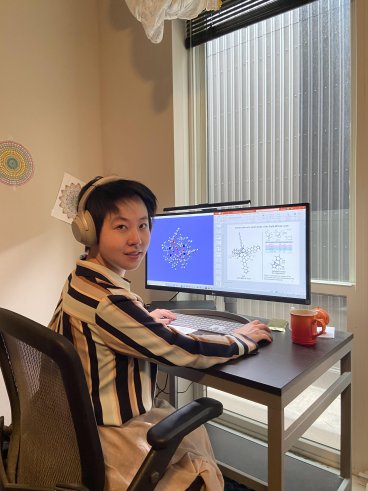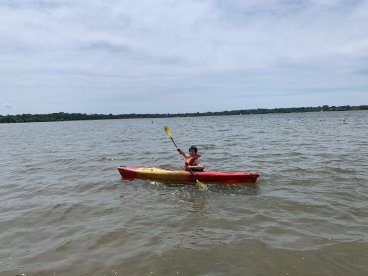Meet CTC: Huiling Shao

06/23/20 -- Huiling Shao is a postdoctoral researcher in the Cramer group. Huiling recently graduated from the University of Pittsburgh in 2019 with a Ph.D. in Chemistry. She received her B.S. degree in Chemistry from the University of Richmond in Virginia.
One of Huiling’s current research projects is to model the mechanism of CO2/cyclohexene oxide copolymerization catalyzed by chiral zinc β-diiminates, and to identify factors affecting reactivity and isotacticity. Isotacticity refers to substituents being arranged in the same (rather than random) configuration in each repeat unit of a polymer. In order to study the mechanisms, she uses density functional theory (DFT) calculations. These calculations provide the relative free energies of key intermediates and transition states of the reaction mechanisms of interest.
Her project aims to design a more reactive and selective catalyst that produces chemically degradable isotactic thermoplastic poly(cyclohexene carbonate). Chemically degradable plastics can be recycled to a monomer stock, which can then produce virgin-quality polymers upon re-polymerization. Studying this process is important because current recycling techniques tend to create polymers with decreased macroscopic properties, causing the plastics to be less degradable in the environment. Her favorite part about research is when her theoretical hypothesis agrees with the experimental observations.
Outside of her research, Huiling enjoys hiking and swimming. Her favorite part about the Twin Cities is being able to enjoy the nice weather in summer.

Why did you choose the University of Minnesota, and what led you to join your current research group?
I wanted to expand my horizons after graduating from U Pitt. Prof. Cramer offered me a special opportunity to work as part of the NSF Center of Sustainable Polymers (CSP), the Inorganometallic Catalyst Design Center (ICDC), and the Nanoporous Materials Genome Center (NMGC). I like the opportunity these centers provide to communicate with people from different backgrounds.
What are you most proud of about your academic career so far, and what’s one thing you’d like to achieve in the future?
I’m proud that I have been able to work with a diverse pool of people on multiple different projects. People from different backgrounds tend to view the same topic from separate perspectives. These views can be highly inspirational, especially when a project gets into a dead-end with your own background alone. In the future, I would like to improve my teaching strategies. I recently started looking for a faculty position at liberal arts colleges, which focus on teaching and research with undergraduate students.

What drives you to be a better scientist?
The curiosity of the unknown. In reality, not all scientific finds originate from grand design. For me, I sometimes design the project for direction A, but instead, it results in B because of small unfulfilled questions along the way.
What drives you to be a better scientist?
There is always a silver lining. All scientists, especially graduate students, are dealing with the absolute unknown. Unlike taking a class, there is no "correct answer" to questions in research, and sometimes the original hypothesis could be wrong. A positive and healthy attitude towards research helps a young scientist to persist longer in the field, which is essential to a successful long-term career path. I am not an expert in the field yet, but I found this strategy helped me along the way.
